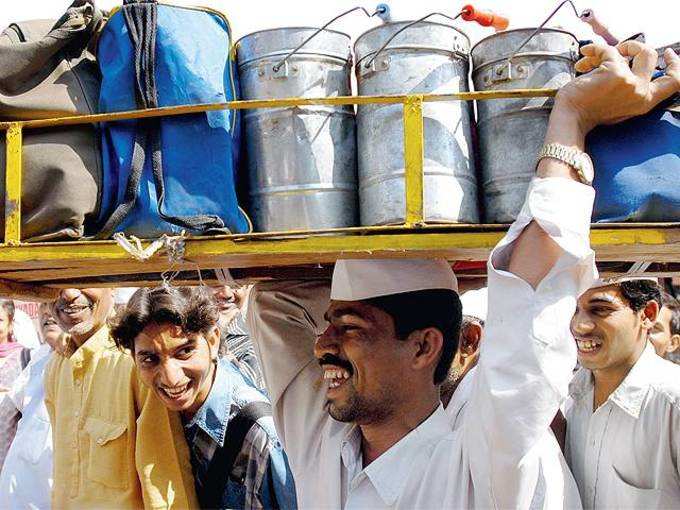 They work to achieve an almost ‘zero error’ work efficiency despite having to use the general modes of transport. The nerves that run through the body of Mumbai, Dabbawallahs are quite an epitome of everything that the city stands for. The grit, the determination, the precision and of course, cooperation – all these qualities make for a typical dabbawallah who serves home cooked fresh food to the working class in Mumbai.
They work to achieve an almost ‘zero error’ work efficiency despite having to use the general modes of transport. The nerves that run through the body of Mumbai, Dabbawallahs are quite an epitome of everything that the city stands for. The grit, the determination, the precision and of course, cooperation – all these qualities make for a typical dabbawallah who serves home cooked fresh food to the working class in Mumbai.Beginning to even explain a complicated network of about 5,000 humble, task-oriented people who are largely illiterate or not well-educated, working through a time-tested model to ensure 175,000 – 200,000 dabbas (
Here are 5 lessons
1. Work focus
In simple terms, a dabbawallah collects lunchboxes, usually three-tiered ones from either homes or caterers, by around 9 am or so on every working day. They are brought to the local railway station on his cycle, which has a heavy carrier specially designed for the purpose. From the station, it changes hands to move to destinations through another dabbawallah, who carries it to the next sorting place. After the sorting and transporting is done in about 2-3 levels, a dabbawallah delivers it to the destination before 1 pm and goes for his lunch break. A round of prayers and lunch over, it is time to collect the boxes, sort them in the same manner and deliver the boxes to the original place, ready to be collected next day.
Mind you, the sorting is a complicated process and is done in matter of seconds with the use of colour coding. When most efficient machines, computers and humans with dedicated service backup can falter, a dabbawallah is completely unforgiving of anything that can amount to a mistake such as a dabba reaching late, or a wrong dabba being delivered to the destination.
2. Complexity and simplicity
What makes it work? Honestly, theories may fall flat to understand anything as complex as this with the help of simple terms and business management theories. What makes this service tick at such economical prices – a dabbawallah charges mere Rs 300 – 500 for each lunch box delivered through the month on all working days – come rain or sun is some sort of fool-proof technique that can work only through punishing practice.
3. Democracy and efficiency
There are quite a few things at work here. Firstly, there is internal democracy that aims at efficiency and service. In the absence of both aspects, a service or ANY service can fall flat. Second is no margin for errors. Move over ISO agencies, a dabbawallah takes his errors much more seriously than any of the management gurus. Irrespective of age, his hunger for precision can only be matched with that of a hungry animal that has his eyes set on only hunting the food. Nothing else is visible to him. He is perfect to the extent of surpassing human tendencies to make errors.
To err is human; and that never makes for a dabbawallah!
4. Best practices
They build relationships that last longer and thus make the service most-essential, most sought-after and highly time-and-goal oriented. They share an emotional bond that exists between people and food. They are the lone bridge that fills this gap. They see no alternative to hard work and super efficient execution of tried and tested methods that have kept up the pace even with changing times.
Best practices, did we hear you say?
5. Impersonal peer monitoring
Monitoring by seniors and peers is the best aspect of this service. The method adopted for this is aimed at increasing efficiency and not antagonizing new entrants into the field. A dabbawallah is guided by his seniors who have an eye for detail, and will ensure there is no error creeping in at any stage working through precise time gaps.
This is autocracy and democracy at its best. The combination can work wonders if implemented well, delivering fantastic results. How else would a simple service such as this, working under not-so-ideal circumstances and rush hours through the years, be given a quality assurance certificate and get a six sigma rating of 99.999999 with just ONE error in six million transactions?
Human mind is the most complicated computer that ever existed on earth. While highly automated companies which charge a bomb for their services and goods, literally bringing customers down from their economic levels, use technology at every step to ensure their operations run smoothly; dabbawallahs have been an example for technology to emulate.
Image: indiatimes